How to Answer IELTS Speaking Part 1 to get Band 8? | Introductory Questions with Sample Answers
Table of Contents

Limited-Time Offer : Access a FREE 10-Day IELTS Study Plan!
Unlike any other module of the IELTS exam, Speaking has a different mode of conduction as it involves human interaction. It is divided into three parts – Interview or Speaking Part 1, Long Turn, (Part 2) and Discussion (Part 3), which lasts for around 11 to 15 minutes.
In this article, we will have a thorough discussion on what comprises Part 1 of the IELTS Speaking test, how to prepare for it, common topics and provide sample questions and answers for self-preparation and evaluation.
What are IELTS Speaking Part 1 Introduction Questions?
- A face-to-face interview with the examiner (4-5 minutes)
- 12 Questions based on 3 Topics
- Questions about yourself, your life and your country
Moreover, in the IELTS Speaking test, you will be marked on your English language ability in four areas.
The Speaking Band Descriptors are:
1) Fluency and Coherence
2) Vocabulary range
3) Grammatical Range and Accuracy
4) Pronunciation
All the above-mentioned band descriptors can be greatly improved through practising pre-written answers to the speaking questions shown below.
The Speaking Part 1 Introduction Questions: Common Topics List
Below is a list of topics and questions that the examiner can ask you in Part 1 of the IELTS Speaking test. Try to prepare based on the topics but do not try to make an attempt to memorize the answers. Prepare your daily life, recent memories, childhood memories, opinions, popular things in your country, etc. Remember – Part 1 is all about you!
- Work
- Study
- Hometown
- Home
- Art
- Clothes
- Computers
- Daily routine
- Bicycles
- Birthdays
- Childhood
- Newspapers
- Pets
- Reading
- Shopping
- Dictionaries
- Evenings
- Family & Friends
- Flowers
- Food
- Going Out
- Happiness
- Hobbies
- Internet
- Leisure time
- Music
- Sport
- TV
- Transport
- Weather
Get Access to the Most Commonly Asked Introduction Questions in Speaking Part 1!
How to Answer the Introductory Questions in Part 1 of the Speaking Test?
The introductory questions are asked at the beginning of Part 1 of the Speaking test for two reasons:
1. To confirm the identity of the Candidate for Examiner and for the DRD recording (DRD means Digital Recording Device).
2. To provide some simple warm-up questions to help the candidate to start thinking in English.
[do_widget id=custom_html-22]
Tip: It is important to remember that in this part of the test, you just need to show that you understand the questions asked by the examiner and can provide simple, yet effective answers in grammatically and stylistically correct English!
You should also keep your answers short so that you will have more time for the rated questions in part 1. The more time you spend answering the introductory questions, the less time you will have to show your English ability in the rated section of part 1.
The IELTS Speaking Part 1 Introduction Questions

Below is an example of how to answer the IELTS Speaking introduction questions:
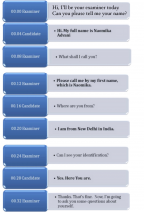
Explanation of the Appropriate answers to the IELTS Speaking introduction questions

Explanation: You are being asked a simple question to confirm your identity. So you only need to confirm your full name.
Below is an example of how to answer the IELTS Speaking introductory questions:
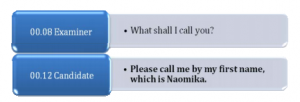
Explanation: Examiners are unlikely to use your name in the interview, so do not worry about your name being possibly difficult for foreigners to pronounce. Simply give the name that your friends and family call you by.
Explanation of the Appropriate answers to the IELTS Speaking Introduction questions
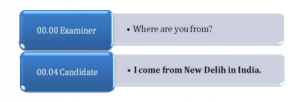
Explanation: you are being asked a simple question to find out which part of your country you are from. So you only need to confirm your home town or province, and where it is in your country.

Explanation: The examiner is asking to see your identification document- either your national identification card or your passport, so you need to have this ready (placed on the table in front of you) to give to the examiner to look at.
Example of BAD answers to the Part 1 IELTS Speaking introduction questions:

Explanation: You are being asked a simple question to confirm your identity. So you only need to confirm your full name. You are not being asked to start a conversation.

Explanation: You are being asked a simple question to confirm your identity for the Digital Recording Device. So you only need to confirm your full name. The examiner is already in your country and probably also lives in your country, so does not need to welcome. Also, this answer is unprofessional – you should avoid being emotional in the Speaking test.

Explanation: You are being asked a simple question to confirm your identity. So you only need to confirm your full name. You are not being asked to start a conversation.

Explanation: You are being asked a simple question to confirm your identity for the DRD recording. So you only need to confirm your full name. You do not need to provide any additional information and will make the examiner’s job more difficult as you have answered questions in Part 1.
Quick Tips for Answering the IELTS Speaking Introduction Questions
Sometimes, situations are different when we practice at home and when we speak in front of a trained IELTS examiner. Considering that as an important part of the exam, we have listed down some tips that you might find useful during your IELTS Speaking Part 1 exam.
- Know what to expect when you walk into the room
- Answers should be: Not too short, not too long
- Reminder: Never memorize your answers
- Take several deep breaths before you begin
- Answer the given question with the relevant information only
- Don’t panic if the examiner stops you in the middle of your answer
- Don’t try and study for every possible topic
- It’s OK to give negative answers
IELTS Speaking Part 1 – Question Topics:
- In Part 1, after the introductory questions, you will be asked 3 questions based upon questions about your daily life.
- Each topic has three questions to answer on that topic.
- As the examiner is allowed 4-5 minutes for part 1 this means that after the introduction there is approximately 1 minute for each topic.
- Therefore you should allow this time limit to allow time to answer each question, and so earn the maximum possible marks.
Tip: You should allow 15 seconds to answer each question to give yourself enough time to answer all the questions and show that you have the required range of English ability.
Each of the three topic questions which you will be asked will use the same following format:
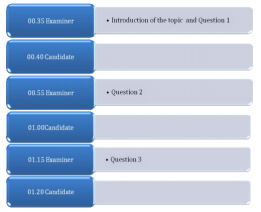
Practice: 42 Topics for IELTS Speaking Part 1 Suggested Answers
Here is a sample topic question:
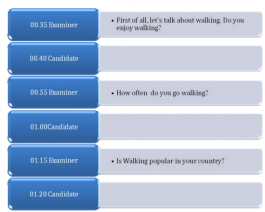
Here is a sample answer followed by explanations as to why the questions were answered in that way,
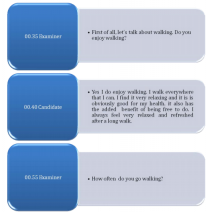
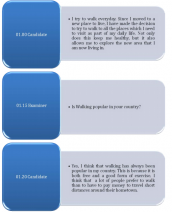
Explanation: The one thing that you must not do in answering a question is to give a one-word answer. So the above answers avoid the first potential way to lose marks.
The answers are also 15 seconds long, which is long enough to answer the question in detail and at the same time short enough to stay within the recommended 1 minute for each topic. This then allows the examiner to ask all the 3 topic questions, and so gives the candidate the opportunity to get more marks.
If you plan to answer three 5-second sentences for each question in part 1 you will have enough time to answer all the questions.
To Recap:
A timing strategy for answering part 1 topic questions:

Review of Part 1 of the Speaking test
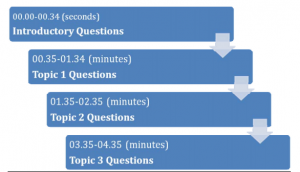
IELTS judges you on the basis of your eloquence and framing of sentences when it comes to speaking tests and our IELTS online classes ensure that we take care of all such parameters that shall improve your performance.
Also Check :
- IELTS Speaking Part 1
- IELTS Speaking preparation tips
- Linking words for IELTS Speaking
- IELTS Speaking recent actual test
- Sports Vocabulary IELTS
- Work Vocabulary IELTS
- Idioms for IELTS Speaking
- IELTS Pronunciation Guide
- Common English Words in IELTS Speaking
- Ough words

Start Preparing for IELTS: Get Your 10-Day Study Plan Today!
Explore other Speaking Part 1 Topics
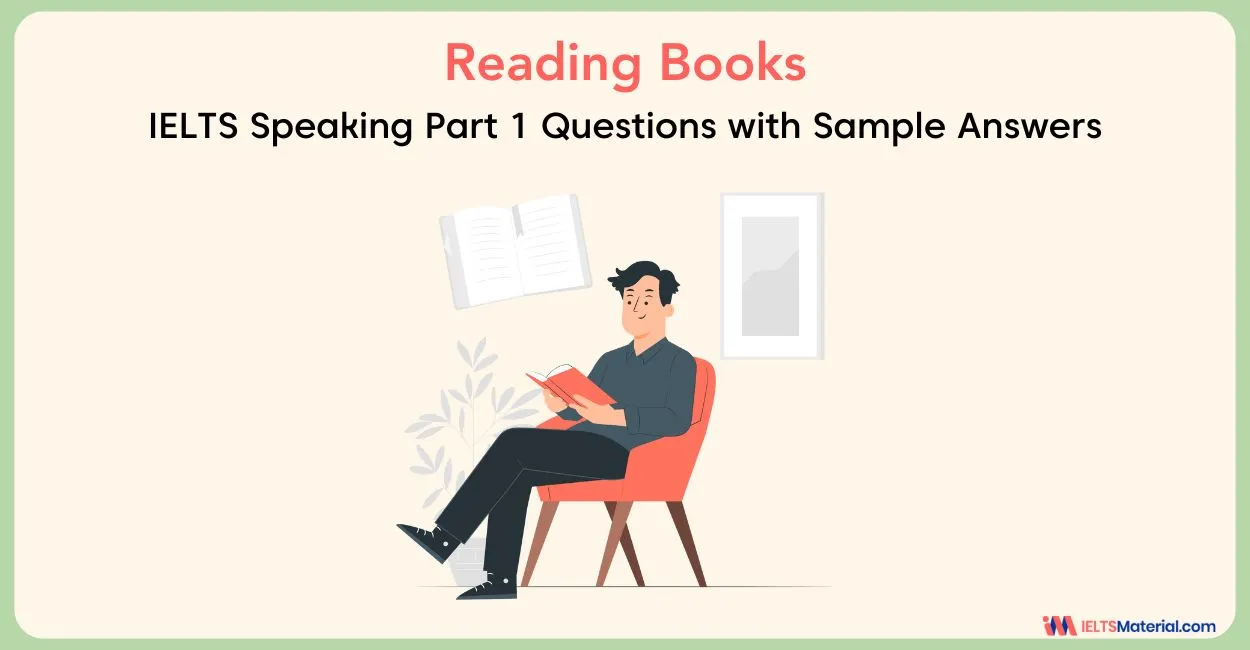
Kasturika Samanta

Raajdeep Saha

Courtney Miller
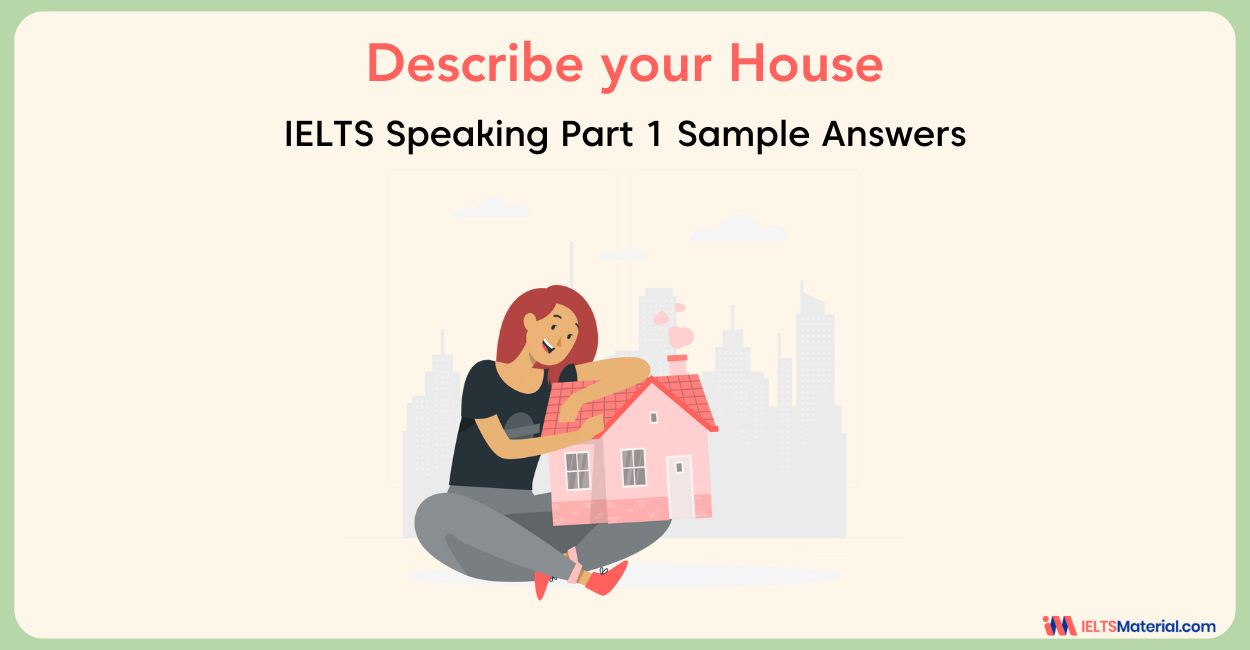
Kasturika Samanta
Recent Articles

Nehasri Ravishenbagam

Nehasri Ravishenbagam

Janice Thompson

Kasturika Samanta
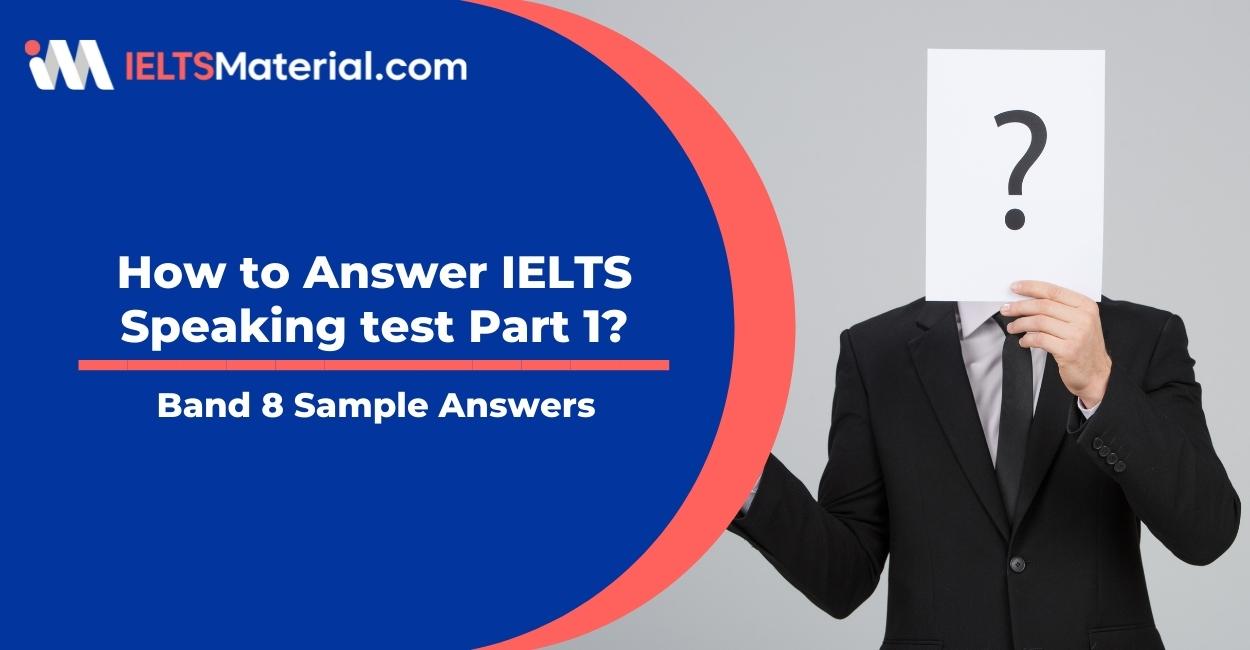



Post your Comments
3 Comments